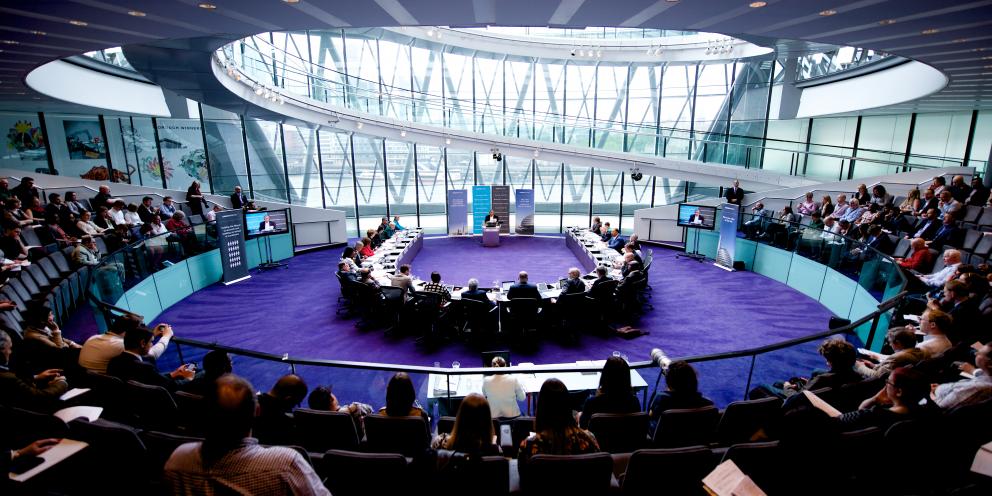Recent political exchanges between the Government and the GLA have focused on a large gap between targets and achievement in housing output during the current Mayor’s tenure [1]. From our perspective in this LSE London event series, the surfacing of this issue really reflects much broader and longer term problems with performance of the strategic planning role for which the Greater London Authority was established in 2000. Our focus, in this seminar and later activities, will continue to be on looking for and addressing remediable obstacles to more effective long term strategic guidance for this complex metropolitan region.
Why Are There Serious Question Marks About The Strategic Character of GLA Planning for London?
The first pair of roundtables in this series of LSE London events identified a range of problematic issues relating to the process of strategy formulation, discussion and follow-through. These seemed to run through the 5 completed rounds of London Plan making and implementation under this regime. Though the experienced participants differed in their emphases (and sometimes about which were the good/bad sides of an issue) there was a degree of consensus about the importance of eight issues, which were highlighted in the summary blog [2].
More specifically, each involved ways in which London’s formal “spatial development strategy” (aka The London Plan) failed on one or both of the crucial identified strategic requirements, that it:
- should be based on an extended spatial and temporal perspective – recognising both:
- (a) interactions with other parts of South East England; and
- (b) dynamics of change/adjustment with fast and slow running elements ; and
- also be grounded on an understanding of the main causal processes underlying these patterns of change and adjustment, including likely responses to different planning / policy interventions.
That all sounds pretty much like a question of:
- working harder at the analytic underpinnings, getting beyond trend identification/ projection, and looking sceptically at the evidence for assumed/expected impacts.
But the constraints on satisfying these strategic requirements are not just ones of knowledge, or the appetite for seeking it out, but (in the London case) at least as much ones of:
- a limited political space for identifying, constructing and debating /evaluating (strategic) alternatives – given the role and format of the GLA. With its disjointed 4 year terms for 25 year horizon plans; plus very limited Assembly powers discouraging widespread coverage/debate; complete disjunction from the surrounding communities; and a final output limited by “town planning” concerns – as well as the normal “capital city” problem of an unsympathetic national government interest.
How Can We Make the London Planning Process Substantially More Strategic?
“Boiling down” the set of problem issues, and fields of underperformance – with what may be my particular take on these – suggested four fairly distinct areas where a gear-change is required in order to boost the “strategic” capacity of the Plan substantially – within existing political arrangements:
(1) Give Much More Attention to Understanding How Core Systems and Processes Operate, Respond and Change. Shortcomings in this respect, and lack of evident concern about it occur across the board. Issues that immediately spring to mind, and which need detailed analysis, involve the processes/factors underlying:
- actual rates of housing completion (locally and across spatially extended housing markets);
- business competitiveness/performance, occupational shifts, and agglomeration/ relocation (now without even a London Business Survey); and
- residential flows, local population composition, densification, displacement, public service demands, in the context of changing accessibilities and international migration flows (about which virtually nothing is said).
In each case there seems a disconnect from external research activity/debates.
(2) Produce, publish, and offer for debate, in the Assembly and Externally an integrated Strategic Assessment (or Options) document, covering economic, spatial, environmental and infrastructural issues – as a starting point to specific work on the spatial development strategy. The aims here would be both:
- to bridge the gaps between these interlinked decision fields (in a way that cannot be done within the straitjacket of an NPPF/town planning oriented “Plan”), drawing explicitly on knowledge/assumptions about the underlying processes; and
- to enable (productive and legitimating) debates about key issues, in a much more rapid, accessible and (hopefully) publicised fashion than in the eventual Examination in Public to which they are very largely restricted at present.
(3) Take the Monitoring function much more seriously – as a learning process. The existing approach of simply tabulating values of a small (now even smaller) set of indicators pre-identified as being critical to judgements of success/failure – in the early years of a long term Plan – seems to have been essentially a waste of time. Very little was ever going to be proved in this way, given how much (an unreported) context matters. And even when – as notoriously with the density standards, where all Mayors delivered decisions which were preponderantly above the target range – something might be proved, the facts and potential lessons were totally ignored in a seemingly tokenistic exercise. The aim has to be not to assign credit/shame but to be able to tell stories about what seems to be happening (expected or not), why and what difference that might make for follow-up action or revision.
(4) To recognise (and indeed celebrate) the role of negotiation with a wider range of powerful actors in the strategic planning process (beyond the usual suspects) – rather than it being thought of as either potentially embarrassing or overly difficult. This is partly the old matter of actually/actively engaging interactively with the local authorities (and other institutions) of the Wider South East to progress some shared concerns – like getting a more elastic housing supply across the region as a whole. But also, a bit more generally the fact that options for strategic action which are both desirable and credible don’t simply pop up from detached analyses, in an ordered kind of way – but tend to require targeted interaction (aka “deals”) . London Mayors should be well placed to fulfil leadership roles in such cases. Relevant examples don’t all involve action across the London border, but surely also involve the City and central government (outside the restrictive framework of budgeting and formal Plan approval). And in these cases, as elsewhere, offer more continuing opportunities for knowledge exchange about (salient) processes at work within the capital.
A General Lesson
Somewhere between the lines in these four concerns is a repeated implication that despite (or because of) its long term horizons, the strategic planning process in London needs to be more effectively embedded in the continuing activities of the GLA, the Assembly, London-wide groups of political actors and the London media. Rather than being seen as a four yearly kind of ritual, starting afresh after each Mayoral election.
[1] https://assets.publishing.service.gov.uk/media/65ca302914b83c000ea716e8/London_Plan_Review_-_Report_of_Expert_Advisers.pdf
[2] https://blogs.lse.ac.uk/lselondon/strengthening-the-strategic-core-of-london-plans-in-the-face-of-new-and-old-challenges/





1 Comments